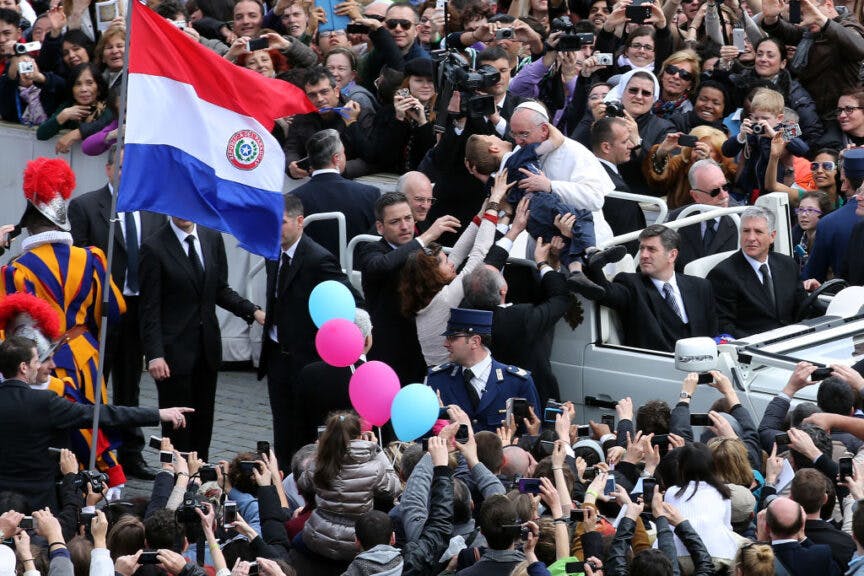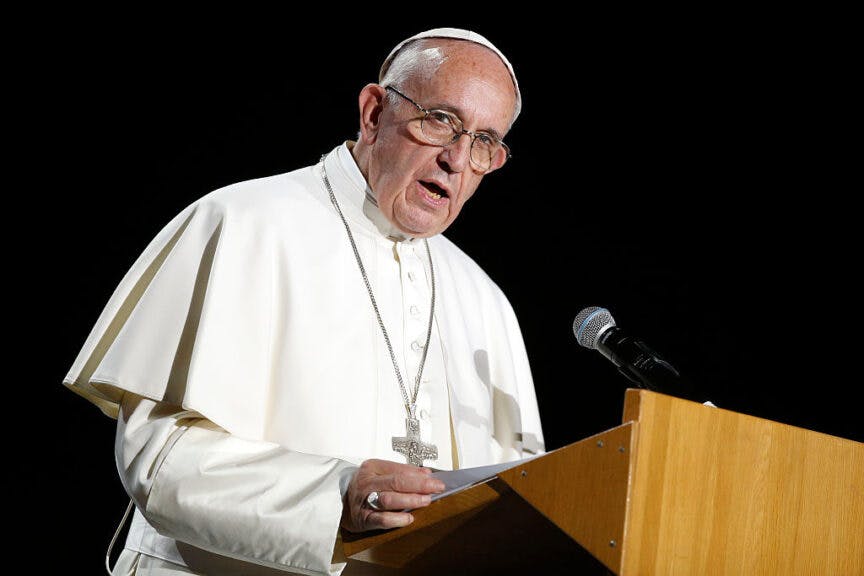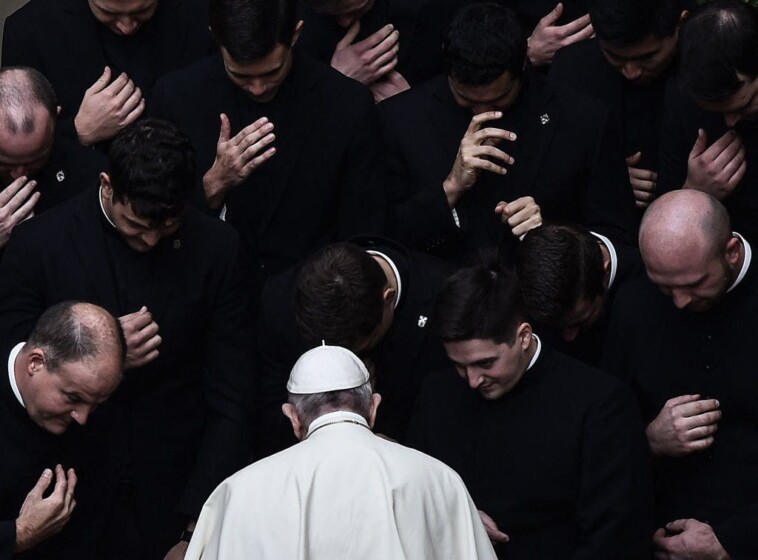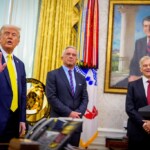G.K. Chesterton wrote of St. Francis of Assisi, “But after all, this man was a man and not half a dozen men. What seems inconsistency to you did not seem inconsistency to him.”
We should keep this same principle in mind today as we continue to pray for the repose of Pope Francis’s soul — and assess what we can learn from his legacy, both good and bad.
Much like the great saint whom he chose as his namesake and clearly intended to emulate, Pope Francis confounded caricature and was often misunderstood. In his life, and especially over the course of his pontificate, this quality often led to confusion for the faithful. No doubt, that pattern of confusion will be one hallmark of Francis’s papacy.
If we hope to learn from the life of Pope Francis, however, we must start by rejecting the mainstream media’s depiction of him as a “liberal” pope. Since his death, the New York Times has been filled with headlines regarding his perspective on “LGBTQ people,” women deacons, or the Church’s teaching on birth control. But while these may be important issues to the opinion writers of the New York Times, they were not central to Pope Francis’s work.
A much better place to begin is, well, the beginning: those early years of the pontificate when an energetic and vigorous Pope Francis set out to reform the Vatican’s bureaucracy and put an emphasis on serving the poor and taking care of the sick.

Franco Origlia/Getty Images
I will never forget when the Pope, in 2013, reached down and kissed a man suffering from neurofibromatosis, a rare disease which had left him disfigured with boils all over his head. And this was far from the only example. In his first year in the seat of St. Peter, Pope Francis made a point of washing the feet of 12 young people at a juvenile detention center, inviting 200 homeless people to dine at the Vatican, and living in a modest guest house rather than the Apostolic Palace.
With this radical humility, Pope Francis — the first Pope from the global South, where the Church continues to grow — reminded the decadent old continent that the cultural inheritance of Christendom is not in attending U.N. Conferences, but the corporal works of mercy: to feed the hungry, give drink to the thirsty, shelter the homeless, visit the sick, visit the prisoners, bury the dead, and give alms to the poor.
Yet as much as Pope Francis loved the poor, he was not a humble Franciscan friar but a savvy Jesuit political operator whose initial attention to the corporal works of mercy — though never entirely lost — soon gave way to practical considerations about what would secure his power over the Church. And unfortunately, as he aged and became more entangled in the politics of the Vatican, Pope Francis became vulnerable to manipulation by his advisers as well as the media and indeed made many missteps that confused and divided his flock.
Examples abound. One week he would promote the blessing of “unions of persons of the same sex.” The next he would say that marriage will always be the union of one man and one woman. On one occasion, he declared that abortion was akin to “hiring a hitman,” while nevertheless appointing a pro-abortion economist to the Pontifical Academy for Life.
And because of his excessive reliance on the likes of Cardinal Blase Cupich — the radical progressive archbishop of Chicago whom he appropriately dubbed “the little woman” — Pope Francis was especially misguided in his approach to more conservative segments of the Church. He imposed serious restrictions on the celebration of the Traditional Latin Mass, which is growing rapidly in the United States. And despite his frequent denunciation of “clericalism,” he upended, for no apparent reason, the constitution of Opus Dei, a prelature distinguished for promoting the role of the laity in the Church’s mission.
In short, rather than working with the young, vibrant, and faithful segments of the Catholic Church, Pope Francis attacked them, choosing instead to champion progressive prelates and priests like Father James Martin, a Jesuit who pushes the Catholic church to abandon the traditional definition of marriage.

Michael Campanella/Getty Images
In spite of his own opposition to these groups, however, Pope Francis’s pontificate witnessed a surge of conservative young people converting to Catholicism, in America and around the world. This Easter, dioceses across the United States reported 30%, 40%, 50%, and even 70% increases in the number of converts coming into the Church on Easter Vigil. Young people seeking stability and rootedness account for most of these conversions, and the same phenomenon is happening in France and England, where a study shows that Gen Z Catholics now outnumber Anglicans two to one.
Amid this renewed interest in the Catholic Church, one of the great tragedies of Pope Francis’s papacy is that his misguided opposition to traditional religious communities and conservative political policies may have given many of these young Catholics the impression that a focus on serving the poor, feeding the hungry, and carrying out the other corporal works of mercy is somehow at odds with tradition and orthodoxy.
Let me be clear: this is not and never has been the case.
Christ tells his disciples in Matthew 25, “whatever you did for one of the least of these brothers and sisters of mine, you did for me.” The corporal works of mercy are essential for all Christians, regardless of denomination or political party. And beyond informing our personal faith, they also must guide our efforts to reclaim our institutions and restore our country.
Moreover, Pope Francis’s liberal posturing on things like the environment may obscure his urgent message to modernity. Consider the late Pope’s 2015 “global warming” encyclical, Laudato Si. While it did include entire sections on “pollution and climate change” which the liberal media fawned over and promoted, its deeper argument — that we have failed to “safeguard the moral conditions for an authentic human ecology” — was profoundly conservative and largely ignored.
In Laudato Si, Pope Francis beautifully lays out how a “technocratic paradigm” has led us to accept “every advance in technology with a view to profit, without concern for its potentially negative impact on human beings.” And in pursuit of this “unlimited human power,” he argues, we have undermined the various conditions that help us flourish: destroyed God’s majestic creation, contracepted our God-given gift to create life, and dishonored God’s plan for men and women to be different.
This message — not misguided one-off statements on airplane interviews or liberal media headlines about hot button political issues — is what we should take away from Pope Francis’s papacy.
Modernity, despite all its advances, has robbed us of many of the most basic spiritual and moral resources we need to flourish and be truly happy. To recover them, we don’t need complex coding or advanced AI, but rather, as Pope Francis sought to remind us, simply to follow the lessons Jesus taught us about serving our fellow man.
Much like the early parts of his pontificate, Pope Francis’s final days reflected this message.
On Sunday, the Pope’s last day on Earth, he met with Vice President JD Vance, squashing their public spat. He used his Easter message to make an appeal for peace in the world’s most war-torn regions. And finally, he made one last loop through St. Peter’s square, stopping several times to bless babies brought up to him and wish all his “brothers and sisters” a “Happy Easter.”
May he rest in peace, mixed legacy and all — and may his brother cardinals be inspired to choose a successor capable of combining Pope Francis’s initial emphasis on the corporal works with a steadfast commitment to tradition, both of which were sorely lacking in the final years of the Holy Father’s life.
* * *
Kevin Roberts is the President of The Heritage Foundation.
The views expressed in this piece are those of the author and do not necessarily represent those of The Daily Wire.



